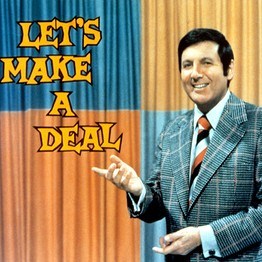You are viewing our site as an Agent, Switch Your View:
Agent | Broker Reset Filters to Default Back to ListHow Will iBuyers Affect Traditional REALTORS?
November 27 2017
 iBuying is the process in which home sellers bypass traditional listing and sales practices, receiving in exchange both cash from a third-party investor and an accelerated closing schedule.
iBuying is the process in which home sellers bypass traditional listing and sales practices, receiving in exchange both cash from a third-party investor and an accelerated closing schedule.
For many home sellers over the last few decades, this iBuying concept has been the stuff of dreams – sweet dreams.
For many real estate agents over the last few decades, this iBuying concept has been the stuff of dreams, too – but for them it may have been nightmares.
In an attempt to allay the fears of sellers, real estate agents might dangle the hope of closing in 60-90 days, and support such a hope by promising that after X open houses and/or Y days, they will lower the price to reel in a buyer. Of course, many homes sell in less than 60 days, and a significant number sell at full, or above, asking price. That's the gamble, right?
For many home sellers, the above narrative from the real estate agent does not instill confidence. But what can you do? This is the way everyone has to do it. Stop. Back up and rewrite that. This is the way everyone had to do it.
The roots of the iBuyer movement can probably be traced to 2014 with the creation of OpenDoor.com, an online home-selling service aimed at streamlining the sales process down to a few days. The iBuyer market began to really gain altitude and speed with the creation of OfferPad.com in early 2016 and Knock.com in mid 2016 with the promise that "We can sell a home in less than six weeks or we buy it ourselves at market value."
By the end of 2016, iBuying was alive and well in a number of major American real estate markets, with Wall Street having pledged over one billion dollars of working capital to the cause.
As if corroborating those efforts from 2016, in May 2017, Zillow Group announced its Instant Offer iBuying program. About a month later, in June 2017, Redfin.com introduced Redfin Now.
 iBuying has quickly become a relatively sophisticated process that takes advantage of a number of digital technologies to provide a simple offer. These technologies, however, are not the sole basis of its newfound success. The essence of iBuying is the process and philosophy through which iBuyers arrive at their offer price. The original iBuyer players essentially identified homes that weren't selling quickly on the open market, which were owned by individuals who identified themselves as "motivated sellers" of distressed properties. The resulting transaction mirrored that distressed status.
iBuying has quickly become a relatively sophisticated process that takes advantage of a number of digital technologies to provide a simple offer. These technologies, however, are not the sole basis of its newfound success. The essence of iBuying is the process and philosophy through which iBuyers arrive at their offer price. The original iBuyer players essentially identified homes that weren't selling quickly on the open market, which were owned by individuals who identified themselves as "motivated sellers" of distressed properties. The resulting transaction mirrored that distressed status.
In sharp contrast, the current iBuyer uses sophisticated technologies to determine the actual market value of the property and generate an offer based upon market value rather than distressed value. This simple shift of philosophy changes the whole game.
A number of top industry analysts are suggesting that the iBuyer market share (especially with Redfin entering with a 7 percent fee) may quickly reach at least 10 percent. Despite these predictions a number of "pro status quo," analysts have taken the position that since this type of program hasn't worked in the past, it never will. After all, who would take less money for their house just to avoid the headaches of the sales process? Well, based upon the current market statistics, it would appear that such an escape is worth something in the nature of 3 to 5 percent of one's home value.
Few industry segments can match the levels of research and analysis that the likes of Wall Street, the Zillow Group and Redfin can bring to bear, and even fewer can match the recent track records of these organizations. For the most part, today's iBuyers are not teenagers doing a start-up in a garage. They are tech savvy, data savvy investor-fed corporations of whom production is expected and even demanded.
Here are some ideas to consider while fashioning your response to this movement:
The Valuation
- In the traditional model, the valuation is described as "what the right buyer is willing to pay," often supported by "comps."
- The iBuyer has the resources to know what the valuation is before actually finding that right buyer.
- With either model, a seller could be misled by an incorrect valuation.
- Sellers can challenge or reject any valuation that they think is unreasonable, and get off the iBuyer bus.
The Offer
- iBuyer offers will be developed in the best interest of the company's investors.
- An offer that is out of hand is in no one's best interest. Real estate is a two-sided proposition and it is the process itself that will ensure that the interests of both are facilitated. Infrastructure and employee time is worth too much to make a career out of low-balling offers.
- iBuyers may either require repairs/replacements of questionable assets, or require corresponding price reductions before sales are complete.
- Sellers can refuse any offer that they think is unreasonable, and get off the iBuyer bus.
The Fees
- The traditional real estate transaction has fees.
- The iBuyer process has fees.
- Many sellers are able to evaluate the fee structure compared to the perceived value of each type of service. Since the assertions of each type of service vary, sellers will choose what they are willing to pay for the perceived value of each.
- There are things that sellers are willing to pay more for, but these things are substantive, verifiable, and perceived by the seller as increasing the value proposition.
The Market
- One can argue that the real estate market is local, including property values and amenities, as well as municipal and cultural opportunities. Each of these things, excluding value, are less a concern for sellers than buyers.
- iBuyers have access to significant information, and will rarely be blindsided on values because they live in some other neighborhood, city or state.
- Certain conditions, such as average closing time, can vary by market. In markets where sellers believe that the iBuyer proposition is not worth the cost, iBuyers will not be competitive.
- The desires, expectations and fears of sellers are common to many markets, regardless of locality.
The iBuyer concept will either survive or fail based on the seller's view of its value proposition vis-à-vis its cost. Perhaps the bigger question for REALTORS is, what will you change in light of this situation to improve your value proposition in the eyes of those sellers?
To view the original article, visit the RECON Intelligence Services blog.









